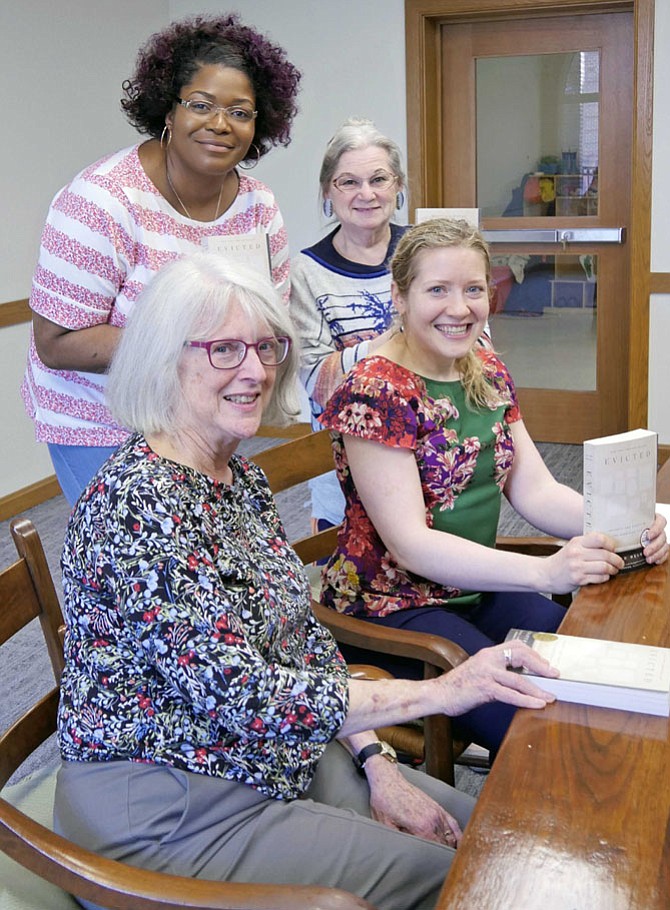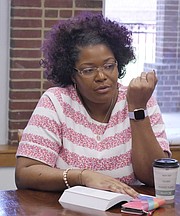Group book discussion of “Evicted: Poverty and Profit in the American City” with from left front: Peggy Greenwood, Rev. Laura Martin, Elaine Eder, and Easterlyn Walters. Photo by Shirley Ruhe.
This is the second in a series focusing on affordable housing in Arlington.
The afternoon started off as a discussion of “Evicted,” the story of eight families in Milwaukee by Pulitzer prize-winning author Matthew Desmond. The author has personal experience, since his own parents went through a foreclosure. The people he interviews live in a world where they know nothing is free, and everyone gets something in return.
He admits that, of course, he did want something — their stories.
In the last 30 years, evictions have become more prevalent, with African American women and children often hit the hardest. In Virginia last year, evictions totaled 150,541.
Several women are sitting around a table. Rev. Laura Martin, associate pastor at Rock Spring United Church of Christ, says, "I've worked for 14 years with housing and homeless. Arlington is different than Milwaukee but there are parallels and themes. What this author does is ethnography or living with people.”
Martin points out that housing is at the base of so many other connecting layers — race, violence in the family. She says one of these stories illustrates that, within groups of people who are really poor, race is used to separate people. Martin says another common theme is that abuse is the price women pay to keep their families housed. "He broke my ribs but he bought my kid shoes. And they are so grateful.”
And people are afraid. If they complain about housing conditions they can lose their trailer. “Even though the trailer may be falling apart, it's all you have. "
"Let's turn to page 236 and read the paragraphs aloud. Peggy you start."
"Is it hard to get in?"
"We do a credit and background check."
"Well, our credit isn't the greatest."
"That's OK as long as you don't have any con-victions or e-victions."
The group agrees this book is not easy to read. When you try to fix one thing, another happens. Martin illustrates the case of a woman whose child had asthma and had to have a $200 inhaler. Her choice was to rent out her couch so she had the funds to buy an inhaler. Maybe the person who rents it is a drunk. “But you don't have the resources so you don't have the choice.”
From the end of the table Easterlyn Walters, now an Arlington resident, speaks up. "I can totally relate. My son Eli and I have been homeless so many times.” She explained she is from Africa so when she became pregnant it was a disgrace to her family. She rotated from a room to a shelter to a friend, a dorm and another shelter.
Walters says, "It is totally dehumanizing to be evicted. You are living paycheck to paycheck and you get a five-day stamp on your door. Then in less than a week they take you to court, less than another week you are out."
Martin interjects, "You have to pay their court costs."
Walters continues, “The Sheriff puts your stuff out on the street without any concern for my clothes or my son’s medication.”
This has been five years ago but she says, "I don't hold on to my things any more because everything feels temporary. Everything can be gone in a minute.” She says the most important thing is making sure everything is OK for Eli as they moved from one basement to the next, “the experience you make for him in the four corners you call home."
Walters says, now that they have a place to live, her son "walks differently; he talks differently. But you live worried it could happen again." Even in their apartment Eli's room is the most put together, but she says in her room things are still in plastic containers. Now she counts every penny each week and shares food and child care with a neighbor. There is a sense of community that we understand and want to help each other. And that’s how we make it.”
Today there is still a tense dynamic with her family. Her son is the bridge. But her family asks for things and “when my father was sick, I tried to help with resources I didn’t have.”
But her family isn’t willing to give her assistance in return. She says, “I’ve had to learn to be selfish and make sure I can take care of us first.”
Walters has told her story before. "People always say 'you don't look like you live in affordable housing.' They have a misconception that they take the bottom of the totem pole. You don't even know what I go through. What you go through and what I go through is the same human experience.
"This book is tough but it is so real because I lived it."


